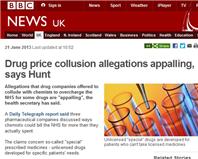Although initially this appears to be somewhat off-topic (OT), further reading expressly identifies the supply of specials such as "unlicensed medicines for patients who, for example, are allergic to the licensed version or cannot swallow tablets and need their medication in liquid form.". Which seems to cover desiccated thyroid and lactose-free. So back fair and squarely on topic.
And every extra penny squeezed out of NHS funds is another argument against being supplied with what is needed. And every extra bit of scandal like this will make getting them ever more difficult even when wholly justified.
21 June 2013 Last updated at 10:52
Drug price collusion allegations appalling, says Hunt
Allegations that drug companies offered to collude with chemists to overcharge the NHS for some drugs are "appalling", the health secretary has said.
A Daily Telegraph report said three pharmaceutical companies discussed ways chemists could bill the NHS for more than they actually spent.
The claims concern so-called "special" prescribed medicines - unlicensed drugs developed for specific patients' needs.
NHS Protect said it was investigating the newspaper claims.
One of the three companies at the centre of the allegations said it had suspended a member of staff.
The two other firms denied the allegations.
Duplicate invoices
UK law allows pharmaceutical companies to develop unlicensed medicines for patients who, for example, are allergic to the licensed version or cannot swallow tablets and need their medication in liquid form.
When a pharmacist prescribes a special medicine they are reimbursed by the NHS for the cost of the drugs, plus a £20 fee. The NHS has to pay because there is no price tariff for so-called "specials".
The market for such drugs in 2010 was worth more than £160m in England.
The Telegraph said it sent its journalists to the annual Pharmacy Congress posing as investors looking to set up a chain of chemist shops.
Representatives selling "unlicensed specials" for three companies suggested ways pharmacists could cut costs - at the expense of the NHS - if they bought their drugs, the newspaper alleged.
The newspaper says one company told their undercover reporters about a "rebate" scheme, whereby the chemist would inflate their invoice to charge the NHS more than they actually paid for the drug.
The company said its sales representative had been "over enthusiastic" and denied offering a rebate scheme.
Another suggested the company could over-charge the chemist by 50%, but that the pharmacists could then claim the excess back. A spokesman for the firm said a staff member had been suspended and that the "alleged views" expressed did not represent its wider "business practice".
A third company offered to provide "duplicate invoices" - a practice which a sales representative said could be described as "slightly perhaps underhand", according to the Telegraph.
The company said the suggestion that it supplied such invoices was "totally inaccurate".
A Department of Health spokeswoman said Health Secretary Jeremy Hunt found the allegations "appalling" but that any fraud investigation was a matter for NHS Protect.
A spokesman for the organisation, which investigates crime inside the health service, said it was looking at the claims and any allegations of fraud would be investigated.
Rod
Added 12:26 21/06/2013:
Also telegraph.co.uk/health/heal...
Added 08:50 22/06/2013
GPhC pledges to investigate Telegraph specials fraud exposé
By Emma Weinbren
The General Pharmaceutical Council (GPhC) has pledged to look into headline allegations of pharmacists defrauding the NHS "as a matter of urgency".
Claims that pharmacists were colluding with specials manufacturers to secure extra NHS payments, splashed on the front page of this morning's Daily Telegraph, were "very serious" and would face immediate investigation, GPhC chief executive Duncan Rudkin told C+D today (June 21).

 The headline suggests it's the allegations but I suspect they mean the fact that it's happening. I am far too literal for my own good!
The headline suggests it's the allegations but I suspect they mean the fact that it's happening. I am far too literal for my own good!
